31 july 2015
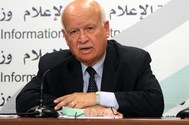
PLO Executive Committee member Zakaria al-Agha said a committee within the Arab Peace Initiative will discuss UNRWA’s financial crisis in its upcoming meeting in Cairo next Wednesday.
During a meeting on Thursday with local popular refugee camp committee heads and the National Works Commission members in Gaza Strip, al-Agha said that UNRWA’s financial crisis is the most difficult one it has faced since its creation, which has affected the services it normally provides.
Al-Agha rejected proposals regarding a four-month shutdown of 700 UNRWA schools which serve around more than 320,000 students from the West Bank and Gaza.
He said that UNRWA should find “realistic” solutions to resolve the issue by finding new donors with the help of other UN agencies.
Al-Agha added that UNRWA Commissioner-General Pierre Krhenbhl, upon Palestinian and Arab requests, has sent a letter to the Secretary General Ban Ki-moon, calling for the General Assembly to take responsibility for UNRWA since it was established by the Assembly after a UN resolution.
Meanwhile, the Palestine Liberation Organization voiced its firm rejection of any attempt to reduce UNRWA services and close refugee schools for a period of four months, warning of the serious repercussions of any such moves on the lives of Palestinian refugees and the educational process in the refugee camps.
The PLO called for the need to prop up UNRWA services especially that no political solution has been provided to work out the refugee crisis.
It further pushed for urging the donor countries to fulfill their pledges and work on assuaging the UNRWA funding crisis.PLO Executive Committee member Zakaria al-Agha said a committee within the Arab Peace Initiative will discuss UNRWA’s financial crisis in its upcoming meeting in Cairo next Wednesday.
During a meeting on Thursday with local popular refugee camp committee heads and the National Works Commission members in Gaza Strip, al-Agha said that UNRWA’s financial crisis is the most difficult one it has faced since its creation, which has affected the services it normally provides.
Al-Agha rejected proposals regarding a four-month shutdown of 700 UNRWA schools which serve around more than 320,000 students from the West Bank and Gaza.
He said that UNRWA should find “realistic” solutions to resolve the issue by finding new donors with the help of other UN agencies.
Al-Agha added that UNRWA Commissioner-General Pierre Krhenbhl, upon Palestinian and Arab requests, has sent a letter to the Secretary General Ban Ki-moon, calling for the General Assembly to take responsibility for UNRWA since it was established by the Assembly after a UN resolution.
Meanwhile, the Palestine Liberation Organization voiced its firm rejection of any attempt to reduce UNRWA services and close refugee schools for a period of four months, warning of the serious repercussions of any such moves on the lives of Palestinian refugees and the educational process in the refugee camps.
During a meeting on Thursday with local popular refugee camp committee heads and the National Works Commission members in Gaza Strip, al-Agha said that UNRWA’s financial crisis is the most difficult one it has faced since its creation, which has affected the services it normally provides.
Al-Agha rejected proposals regarding a four-month shutdown of 700 UNRWA schools which serve around more than 320,000 students from the West Bank and Gaza.
He said that UNRWA should find “realistic” solutions to resolve the issue by finding new donors with the help of other UN agencies.
Al-Agha added that UNRWA Commissioner-General Pierre Krhenbhl, upon Palestinian and Arab requests, has sent a letter to the Secretary General Ban Ki-moon, calling for the General Assembly to take responsibility for UNRWA since it was established by the Assembly after a UN resolution.
Meanwhile, the Palestine Liberation Organization voiced its firm rejection of any attempt to reduce UNRWA services and close refugee schools for a period of four months, warning of the serious repercussions of any such moves on the lives of Palestinian refugees and the educational process in the refugee camps.
The PLO called for the need to prop up UNRWA services especially that no political solution has been provided to work out the refugee crisis.
It further pushed for urging the donor countries to fulfill their pledges and work on assuaging the UNRWA funding crisis.PLO Executive Committee member Zakaria al-Agha said a committee within the Arab Peace Initiative will discuss UNRWA’s financial crisis in its upcoming meeting in Cairo next Wednesday.
During a meeting on Thursday with local popular refugee camp committee heads and the National Works Commission members in Gaza Strip, al-Agha said that UNRWA’s financial crisis is the most difficult one it has faced since its creation, which has affected the services it normally provides.
Al-Agha rejected proposals regarding a four-month shutdown of 700 UNRWA schools which serve around more than 320,000 students from the West Bank and Gaza.
He said that UNRWA should find “realistic” solutions to resolve the issue by finding new donors with the help of other UN agencies.
Al-Agha added that UNRWA Commissioner-General Pierre Krhenbhl, upon Palestinian and Arab requests, has sent a letter to the Secretary General Ban Ki-moon, calling for the General Assembly to take responsibility for UNRWA since it was established by the Assembly after a UN resolution.
Meanwhile, the Palestine Liberation Organization voiced its firm rejection of any attempt to reduce UNRWA services and close refugee schools for a period of four months, warning of the serious repercussions of any such moves on the lives of Palestinian refugees and the educational process in the refugee camps.
30 july 2015
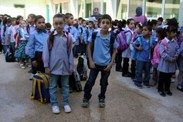
Sandra Mitchell, Deputy Commissioner General of the United Nations Relief and Works Agency for Palestinian Refugees (UNRWA), said on Thursday the Agency will determine the academic calendar in two weeks.
Mitchell said, in a meeting in the UNRWA headquarter in Beitunia town in the West Bank, that no deferment decision has been made for the new academic year in UNRWA’s schools. Two weeks are enough to urge the donor countries to offer aid before issuing any decision in this regard.
"In case of deciding to defer the academic year, the students will be compensated like what happened in Gaza Strip after the Israeli aggression last summer," she pointed out.
Mitchell also stressed that the UNRWA will continue offering aid to Palestinian refugees despite the financial crisis.
Regarding the causes of the crisis, she revealed that the needs are growing up in light of donation proportions, taking into consideration the increasing number of refugees because of the natural increase of population, the Israeli occupation, the blockade of Gaza, Syrian war and others reasons related to job opportunities in Lebanon.
Mitchell said, in a meeting in the UNRWA headquarter in Beitunia town in the West Bank, that no deferment decision has been made for the new academic year in UNRWA’s schools. Two weeks are enough to urge the donor countries to offer aid before issuing any decision in this regard.
"In case of deciding to defer the academic year, the students will be compensated like what happened in Gaza Strip after the Israeli aggression last summer," she pointed out.
Mitchell also stressed that the UNRWA will continue offering aid to Palestinian refugees despite the financial crisis.
Regarding the causes of the crisis, she revealed that the needs are growing up in light of donation proportions, taking into consideration the increasing number of refugees because of the natural increase of population, the Israeli occupation, the blockade of Gaza, Syrian war and others reasons related to job opportunities in Lebanon.
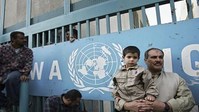
The UN agency for Palestinian refugees said Wednesday that a decision to delay the school year has not yet been taken, although a "tough decision" may be made if the agency's budget deficit is not covered in the coming weeks.
UNRWA spokesperson Sami Mushasha said in a statement: "We can’t operate the education program, which is our biggest program, if we are unable to guarantee to the students and their families that we can keep our schools open until the end of the school year."
He said that unless the budget deficit of $101 million is covered before the start of the school year, "the agency will be obliged to take a tough decision related to its ability to operate its schools and professional training centers."
Mushasha said that the agency was reaching out to its main donor countries in an attempt to cover the budget deficit.
He added that UN Secretary-General Ban Ki-moon was urging the nations to allocate funds to UNRWA as soon as possible.
UNRWA, the largest service provider for Palestinian refugees in the Middle East, has been struggling in recent months to secure donor funding, forcing the agency to scale back its core services, including education, as well as its emergency relief programs.
The agency held an emergency session last week to discuss what they termed as their "most severe financial crisis ever."
UNRWA spokesperson Sami Mushasha said in a statement: "We can’t operate the education program, which is our biggest program, if we are unable to guarantee to the students and their families that we can keep our schools open until the end of the school year."
He said that unless the budget deficit of $101 million is covered before the start of the school year, "the agency will be obliged to take a tough decision related to its ability to operate its schools and professional training centers."
Mushasha said that the agency was reaching out to its main donor countries in an attempt to cover the budget deficit.
He added that UN Secretary-General Ban Ki-moon was urging the nations to allocate funds to UNRWA as soon as possible.
UNRWA, the largest service provider for Palestinian refugees in the Middle East, has been struggling in recent months to secure donor funding, forcing the agency to scale back its core services, including education, as well as its emergency relief programs.
The agency held an emergency session last week to discuss what they termed as their "most severe financial crisis ever."
29 july 2015
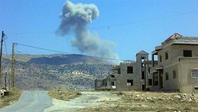
A blast targets the outskirts of the Lebanese border town of Koussaya, July 29, 2015
At least six people have been injured after an Israeli drone attacked the base of a Palestinian group in east Lebanon.
An unmanned aerial vehicle (UAV) belonging to Israeli military targeted the base belonging to the Popular Front for the Liberation of Palestine-General Command (PFLP-GC) near the Lebanese border with Syria on Wednesday, the Lebanese newspaper the Daily Star reported.
Abu Imad Ramez Mustafa, the PFLP-GC’s spokesperson in Lebanon, confirmed that the Israeli drone targeted the group's base in the Zahle district of the border town of Qousaya.
Mustafa also described the Israeli regime as the avowed enemy of the group.
“It was simply because they are one of our primary enemies.”
The Wednesday's strike caused a large blast, stirring panic among the residents.
Also in August 2013, an Israeli warplanes bombed a PFLP-GC base south of the Lebanese capital Beirut.
Earlier on Wednesday, an Israeli drone strike reportedly killed at least two members of the Syrian Armed Forces in Syria’s strategic southwestern province of Quneitra, located on the Syrian side of the Golan Heights, according to Lebanon's al-Manar TV.
However, the so-called Syrian Observatory for Human Rights said an Israeli plane had hit a car, killing two men from the Lebanese resistance movement Hezbollah, and three men from pro-government popular committees in the Druze town.
At least six people have been injured after an Israeli drone attacked the base of a Palestinian group in east Lebanon.
An unmanned aerial vehicle (UAV) belonging to Israeli military targeted the base belonging to the Popular Front for the Liberation of Palestine-General Command (PFLP-GC) near the Lebanese border with Syria on Wednesday, the Lebanese newspaper the Daily Star reported.
Abu Imad Ramez Mustafa, the PFLP-GC’s spokesperson in Lebanon, confirmed that the Israeli drone targeted the group's base in the Zahle district of the border town of Qousaya.
Mustafa also described the Israeli regime as the avowed enemy of the group.
“It was simply because they are one of our primary enemies.”
The Wednesday's strike caused a large blast, stirring panic among the residents.
Also in August 2013, an Israeli warplanes bombed a PFLP-GC base south of the Lebanese capital Beirut.
Earlier on Wednesday, an Israeli drone strike reportedly killed at least two members of the Syrian Armed Forces in Syria’s strategic southwestern province of Quneitra, located on the Syrian side of the Golan Heights, according to Lebanon's al-Manar TV.
However, the so-called Syrian Observatory for Human Rights said an Israeli plane had hit a car, killing two men from the Lebanese resistance movement Hezbollah, and three men from pro-government popular committees in the Druze town.
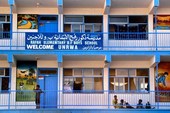
The UNRWA has warned it will have to delay the start of the school year in its educational institutions inside and outside Palestine if its severe financial crisis has not been addressed soon.
The UNRWA has not taken yet a decision to postpone the study in its schools and training centers, but it will be forced to do so if its budget deficit of 101 million dollars has not been covered before the start of the school year, according to its spokesman Sami Mushasha on Tuesday.
The spokesman pointed out to diplomatic efforts being made currently by the agency to urge the donor countries to provide it with its financial needs and to permanently fulfil their obligations towards it.
The UNRWA has not taken yet a decision to postpone the study in its schools and training centers, but it will be forced to do so if its budget deficit of 101 million dollars has not been covered before the start of the school year, according to its spokesman Sami Mushasha on Tuesday.
The spokesman pointed out to diplomatic efforts being made currently by the agency to urge the donor countries to provide it with its financial needs and to permanently fulfil their obligations towards it.
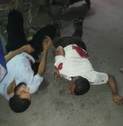
Mohamed Omar and his cousin Mahmoud
A shooting in the Ein al-Helwa refugee camp, in Lebanon, overnight Tuesday killed two people and wounded five others.
An ambush targeted Mohamed Omar and his cousin Mahmoud, of the Jund al-Sham group. Both were rushed to the camp’s clinics for urgent treatment.
Member of the Fatah party Talal al-Maqdah was killed in another attack by masked gunmen a while later.
An exchange of fire at the camp also took away the life of a civilian at the camp called Diab al-Mohamed.
Three more refugees have reportedly sustained wounds and were transferred to hospitals.
Dozens of Palestinian families, including some who had sought refuge in the camp after escaping violence in Syria, fled the camp during the clashes.
The outbreak of violence came three days after Fatah official Talal al-Ourdoni was shot dead by unidentified assailants.
Lebanese army units tightened security measures around the camp and deployed forces over a number of buildings so as to assuage the simmering tension.
A shooting in the Ein al-Helwa refugee camp, in Lebanon, overnight Tuesday killed two people and wounded five others.
An ambush targeted Mohamed Omar and his cousin Mahmoud, of the Jund al-Sham group. Both were rushed to the camp’s clinics for urgent treatment.
Member of the Fatah party Talal al-Maqdah was killed in another attack by masked gunmen a while later.
An exchange of fire at the camp also took away the life of a civilian at the camp called Diab al-Mohamed.
Three more refugees have reportedly sustained wounds and were transferred to hospitals.
Dozens of Palestinian families, including some who had sought refuge in the camp after escaping violence in Syria, fled the camp during the clashes.
The outbreak of violence came three days after Fatah official Talal al-Ourdoni was shot dead by unidentified assailants.
Lebanese army units tightened security measures around the camp and deployed forces over a number of buildings so as to assuage the simmering tension.
26 july 2015
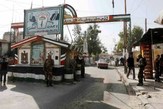
The Hamas Movement strongly denounced the assassination of senior Fatah official Talal Balawneh in Ein el-Hilweh refugee camp, south of Lebanon.
In a press release on Saturday, Hamas reiterated its condemnation of all killing incidents that had happened in Ein el-Hilweh camp.
The Movement said it embarked on making contacts with the Palestinian higher security committee in Lebanon and the highest political levels in order to contain the situation, identify the perpetrators and work on sparing the camp any conflict.
Talal Balawneh, who was known as al-Ordouni, was shot dead on Saturday by two unidentified men while he was walking in the southern part of Ein el-Hilweh, a Lebanese security official told Anadolu news agency.
Al-Ordouni was escorted by two bodyguards, one was also killed and the other was wounded.
In a press release on Saturday, Hamas reiterated its condemnation of all killing incidents that had happened in Ein el-Hilweh camp.
The Movement said it embarked on making contacts with the Palestinian higher security committee in Lebanon and the highest political levels in order to contain the situation, identify the perpetrators and work on sparing the camp any conflict.
Talal Balawneh, who was known as al-Ordouni, was shot dead on Saturday by two unidentified men while he was walking in the southern part of Ein el-Hilweh, a Lebanese security official told Anadolu news agency.
Al-Ordouni was escorted by two bodyguards, one was also killed and the other was wounded.
25 july 2015
|
|
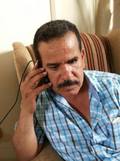
A senior Fatah member was shot dead in the Ain al-Hilweh refugee camp near Sidon in south Lebanon Saturday, a security official said.
Colonel Talal al-Ourdouni was shot dead by in a drive-by shooting involving four men on two motorcycles, a Palestinian security officer in Lebanon told Ma'an. Al-Ourdouni headed a division within the Palestinian national security service in Ain al-Hilweh, the largest of the refugee camps in Lebanon, where armed forces went on the alert after the murders. |
He had been the target of several previous attempts to kill him. Al-Ourdouni was accompanied by two bodyguards, one of whom was also killed and the other wounded.
Palestinian security forces believe the attack came from suspects who reside inside the camp, as Palestinian checkpoints guard every entrance. So far no suspects have been indentified, but investigators are collecting evidence, speaking with witnesses and checking footage from around 20 security cameras in the area.
He stressed that patrols have been deployed on all streets and alleys of the camp to insure security and order after the shooting.Most Palestinians live in squalid conditions in the Lebanon's 12 official camps.
The Lebanese army does not enter the camps, under a tacit deal agreed after the 1975-1990 civil war. Palestinian factions are responsible for security. Ain al-Hilweh has been the location for the settling of scores between several factions, and a breeding ground for extremist groups because of the poverty there.
Palestinian security forces believe the attack came from suspects who reside inside the camp, as Palestinian checkpoints guard every entrance. So far no suspects have been indentified, but investigators are collecting evidence, speaking with witnesses and checking footage from around 20 security cameras in the area.
He stressed that patrols have been deployed on all streets and alleys of the camp to insure security and order after the shooting.Most Palestinians live in squalid conditions in the Lebanon's 12 official camps.
The Lebanese army does not enter the camps, under a tacit deal agreed after the 1975-1990 civil war. Palestinian factions are responsible for security. Ain al-Hilweh has been the location for the settling of scores between several factions, and a breeding ground for extremist groups because of the poverty there.
24 july 2015
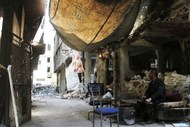
The United Nations removed the Palestinian Yarmouk refugee camp from a list of besieged areas in Syria despite not having direct access to the camp for five months, a humanitarian news group said Friday.
"The UN continues to have no direct access, but has been able, with partners, to deliver aid to three nearby suburbs. Consequently, in his latest report to the UN Security Council, Secretary General Ban Ki-Moon reclassified the camp," IRIN reported.
The camp has been devastated since the start of the Syrian civil war in 2011. A resident of the camp reportedly told IRIN that people were still being denied entry and exit to Yarmouk.
The news comes shortly after the Palestinian ambassador to Syria Anwar Abd al-Hadi’s denied earlier this month that there had been talks with Syria regarding the prevention of Palestinians from traveling outside or inside Syrian lands.The Yarmouk resident, speaking to IRIN, said that that residents had not received any support for over 50 days.
"When told that the UN no longer considered the camp under siege, he called the organization 'liars,'" IRIN said. The denial of aid was confirmed to IRIN by the UN’s agency for Palestinians and the leading UN body concerned with Yarmouk, UNWRA. “Access to Yarmouk in the context of the last few years has been appalling,” UNWRA spokesperson Chris Gunness said.
“We have not managed to have the access that we need and certainly we have not been in the camp since March 28, just a few days before ISIS moved in," he added.IRIN cited a recent report by the UN secretary-general (UNSG) on Syria arguing: "Aid has reached those who have crossed into the neighboring areas of Yalda, Babila and Beit Sahm, but even that assistance has been cut off since the government withdrew permission on 8 June."
The UN defines a besieged area as one that is, "surrounded by armed actors with the sustained effect that humanitarian assistance cannot regularly enter, and civilians, the sick and wounded cannot regularly exit the area,” however critics argue the definition is not applied consistently."
The reclassification of Yarmouk...comes as the United Nations faces separate criticism for allegedly underestimating the number of people under siege, particularly those by the Syrian regime," IRIN said. "The Syrian American Medical Society Foundation, a US-registered non-profit, released a report in March alleging that more than 600,000 people are under siege by government forces, more than treble the number the UN claimed at the time," the group added."
The report, which did not include more than 200,000 people under siege by the so-called Islamic State, identified 38 communities it said should be considered, beyond those the UN actually recognizes. "OCHA spokesperson Amanda Pitt did not comment on exactly when Yarmouk was reclassified, but told IRIN: “For the time being, Yarmouk is not considered besieged but it remains an area of highest concern."
“Thousands of civilians remain trapped in the area, and thousands more have been displaced to the surrounding areas of Yalda, Babila and Beit Saham,” she added in her statement to IRIN.
Yarmouk residents are one portion of around 600,000 Palestinian refugees living in Syria despite the ongoing war between regime and rebel forces, as well as increasing takeover of the country by the Islamic State group (IS).
Around 18,000 remained in Yarmouk following a nearly two-year long government siege imposed after rebel forces took up positions inside the camp, making life virtually unlivable for residents.
The Yarmouk refugee camp -- created in 1957 for Palestinians displaced by the establishment of Israel in 1948 -- was once home to more than 160,000 people. In June PLO member Ahmad Majdalani said that around 7,000 Palestinian refugees remain in Yarmouk, adding at the time that situation there was growing "worse and worse."
In addition to the government siege, conditions in the camp had begun to decline in April when IS stormed the camp, reportedly taking control of nearly 80 percent of Yarmouk. By the end of May, Palestinian groups were believed to control 40 percent of the camp, according to Palestinian official Khaled Abdel Majid.
As June came to a close, Majdalani said that some 150,000 Palestinian refugees in four camps on the outskirts of Damascus were facing severe threats due to ongoing fighting in the Syrian conflict.
"The UN continues to have no direct access, but has been able, with partners, to deliver aid to three nearby suburbs. Consequently, in his latest report to the UN Security Council, Secretary General Ban Ki-Moon reclassified the camp," IRIN reported.
The camp has been devastated since the start of the Syrian civil war in 2011. A resident of the camp reportedly told IRIN that people were still being denied entry and exit to Yarmouk.
The news comes shortly after the Palestinian ambassador to Syria Anwar Abd al-Hadi’s denied earlier this month that there had been talks with Syria regarding the prevention of Palestinians from traveling outside or inside Syrian lands.The Yarmouk resident, speaking to IRIN, said that that residents had not received any support for over 50 days.
"When told that the UN no longer considered the camp under siege, he called the organization 'liars,'" IRIN said. The denial of aid was confirmed to IRIN by the UN’s agency for Palestinians and the leading UN body concerned with Yarmouk, UNWRA. “Access to Yarmouk in the context of the last few years has been appalling,” UNWRA spokesperson Chris Gunness said.
“We have not managed to have the access that we need and certainly we have not been in the camp since March 28, just a few days before ISIS moved in," he added.IRIN cited a recent report by the UN secretary-general (UNSG) on Syria arguing: "Aid has reached those who have crossed into the neighboring areas of Yalda, Babila and Beit Sahm, but even that assistance has been cut off since the government withdrew permission on 8 June."
The UN defines a besieged area as one that is, "surrounded by armed actors with the sustained effect that humanitarian assistance cannot regularly enter, and civilians, the sick and wounded cannot regularly exit the area,” however critics argue the definition is not applied consistently."
The reclassification of Yarmouk...comes as the United Nations faces separate criticism for allegedly underestimating the number of people under siege, particularly those by the Syrian regime," IRIN said. "The Syrian American Medical Society Foundation, a US-registered non-profit, released a report in March alleging that more than 600,000 people are under siege by government forces, more than treble the number the UN claimed at the time," the group added."
The report, which did not include more than 200,000 people under siege by the so-called Islamic State, identified 38 communities it said should be considered, beyond those the UN actually recognizes. "OCHA spokesperson Amanda Pitt did not comment on exactly when Yarmouk was reclassified, but told IRIN: “For the time being, Yarmouk is not considered besieged but it remains an area of highest concern."
“Thousands of civilians remain trapped in the area, and thousands more have been displaced to the surrounding areas of Yalda, Babila and Beit Saham,” she added in her statement to IRIN.
Yarmouk residents are one portion of around 600,000 Palestinian refugees living in Syria despite the ongoing war between regime and rebel forces, as well as increasing takeover of the country by the Islamic State group (IS).
Around 18,000 remained in Yarmouk following a nearly two-year long government siege imposed after rebel forces took up positions inside the camp, making life virtually unlivable for residents.
The Yarmouk refugee camp -- created in 1957 for Palestinians displaced by the establishment of Israel in 1948 -- was once home to more than 160,000 people. In June PLO member Ahmad Majdalani said that around 7,000 Palestinian refugees remain in Yarmouk, adding at the time that situation there was growing "worse and worse."
In addition to the government siege, conditions in the camp had begun to decline in April when IS stormed the camp, reportedly taking control of nearly 80 percent of Yarmouk. By the end of May, Palestinian groups were believed to control 40 percent of the camp, according to Palestinian official Khaled Abdel Majid.
As June came to a close, Majdalani said that some 150,000 Palestinian refugees in four camps on the outskirts of Damascus were facing severe threats due to ongoing fighting in the Syrian conflict.
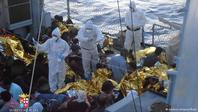
An Irish naval vessel on Thursday evening rescued some 370 migrants, including Palestinians and Syrians, as they tried to reach European shores on board the so-called “death boats.”
The Action Group for Palestinians in Syria said, in a Friday statement, the Irish vessel brought some 370 migrants to safety, including 75 women and 15 children.
Among those rescued was a woman who gave birth to a baby after being onboard the Irish ship.
The migrants were later evacuated to an Italian seaport.
The tragic and extremely dire living conditions endured by Palestinian refugees in war-tattered Syria have forced thousands to run the risk of death at sea in search for a livelihood to feed their starved children, a situation which many rescued migrants say is no worse than the dire circumstances they found themselves in.
The Action Group for Palestinians in Syria said, in a Friday statement, the Irish vessel brought some 370 migrants to safety, including 75 women and 15 children.
Among those rescued was a woman who gave birth to a baby after being onboard the Irish ship.
The migrants were later evacuated to an Italian seaport.
The tragic and extremely dire living conditions endured by Palestinian refugees in war-tattered Syria have forced thousands to run the risk of death at sea in search for a livelihood to feed their starved children, a situation which many rescued migrants say is no worse than the dire circumstances they found themselves in.
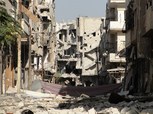
At least four Palestinians, mostly children, were killed south of Syria when the Daraa refugee camp came under heavy shelling by Syrian regime troops on Thursday evening, the Action Group for the Palestinians of Syria said.
The shelling also caused several injuries among civilians in the camp and widespread destruction, according to the group.
The group was unable to know the final number of the victims because of the escalating violence in the area.
The children, who were killed in the camp, were identified as Hamza al-Masri, Aya al-Masri and Asmaa al-Zalfi.
The shelling also caused several injuries among civilians in the camp and widespread destruction, according to the group.
The group was unable to know the final number of the victims because of the escalating violence in the area.
The children, who were killed in the camp, were identified as Hamza al-Masri, Aya al-Masri and Asmaa al-Zalfi.

A group of pro-Palestinian human rights activists have called on the Turkish authorities to work on ending the humanitarian suffering of the Palestinian refugees who fled from Syria to Turkey.
This came in a press release issued by a team of activists working on documenting violations against the Palestinians around the world and published on Friday by the Action Group for the Palestinians of Syria.
The activists appealed to the Turkish president and his government to facilitate the entry of the Palestinians fleeing the ravages of the Syrian war to the country by granting them official entry visas.
Their statement also urged all human rights groups inside and outside Palestine to intervene to stop all the violations which the Palestinian asylum seekers and refugees are exposed to by Turkish border officials and soldiers.
The statement also demanded the Palestine Liberation Organization (PLO) and the Palestinian Authority embassy in Ankara to assume their responsibilities towards the Palestinian refugees, provide them with passports, and intervene with the Turkish authorities to facilitate their stay in the country.
This came in a press release issued by a team of activists working on documenting violations against the Palestinians around the world and published on Friday by the Action Group for the Palestinians of Syria.
The activists appealed to the Turkish president and his government to facilitate the entry of the Palestinians fleeing the ravages of the Syrian war to the country by granting them official entry visas.
Their statement also urged all human rights groups inside and outside Palestine to intervene to stop all the violations which the Palestinian asylum seekers and refugees are exposed to by Turkish border officials and soldiers.
The statement also demanded the Palestine Liberation Organization (PLO) and the Palestinian Authority embassy in Ankara to assume their responsibilities towards the Palestinian refugees, provide them with passports, and intervene with the Turkish authorities to facilitate their stay in the country.
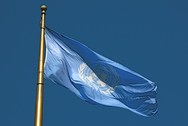
The United States government is providing a US$13 million contribution as a response to the UNRWA Syria crisis, affecting hundreds of Palestinian refugees in the war-tattered territory.
US$9.1 million of the new contribution will support the Agency’s humanitarian work inside Syria, where an estimated 95 per cent of the 480,000 Palestinian refugees remaining in Syria are fully dependent on UNRWA humanitarian assistance to meet their minimum food, shelter, health, water and sanitation needs.
An additional US$ 3.9 million will support the humanitarian needs of the 45,000 Palestinian refugees from Syria (PRS) who have fled to Lebanon and the more than 15,500 PRS recorded with UNRWA in Jordan.
A statement by the UNRWA said PRS in Lebanon and Jordan face increasing poverty and vulnerability. PRS in Lebanon have little access to livelihood opportunities or public services, and UNRWA cash assistance represents the main source of income for over 95 per cent of PRS and the sole income for over 75 per cent of this especially vulnerable population.
In Jordan, UNRWA cash assistance is the main source of income for PRS who struggle to meet their most basic needs, such as ensuring their children have enough to eat. Eighty-two per cent of PRS in Jordan have been assessed as ‘most vulnerable’, including 42 per cent assessed as ‘extremely vulnerable’.
The cumulative effects of four years of war meant that the humanitarian crisis for Palestinian refugees in Syria is more severe than ever. Fear, anxiety and despair are rampant in the war-ragged territory, where securing funding to support even the most basic needs of a desperate community of Palestinian refugees remains a challenge.
US$9.1 million of the new contribution will support the Agency’s humanitarian work inside Syria, where an estimated 95 per cent of the 480,000 Palestinian refugees remaining in Syria are fully dependent on UNRWA humanitarian assistance to meet their minimum food, shelter, health, water and sanitation needs.
An additional US$ 3.9 million will support the humanitarian needs of the 45,000 Palestinian refugees from Syria (PRS) who have fled to Lebanon and the more than 15,500 PRS recorded with UNRWA in Jordan.
A statement by the UNRWA said PRS in Lebanon and Jordan face increasing poverty and vulnerability. PRS in Lebanon have little access to livelihood opportunities or public services, and UNRWA cash assistance represents the main source of income for over 95 per cent of PRS and the sole income for over 75 per cent of this especially vulnerable population.
In Jordan, UNRWA cash assistance is the main source of income for PRS who struggle to meet their most basic needs, such as ensuring their children have enough to eat. Eighty-two per cent of PRS in Jordan have been assessed as ‘most vulnerable’, including 42 per cent assessed as ‘extremely vulnerable’.
The cumulative effects of four years of war meant that the humanitarian crisis for Palestinian refugees in Syria is more severe than ever. Fear, anxiety and despair are rampant in the war-ragged territory, where securing funding to support even the most basic needs of a desperate community of Palestinian refugees remains a challenge.
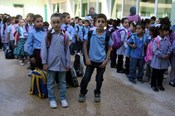
The United Nations on Thursday warned that 700 schools for Palestinian refugees across the Middle East are very likely to be closed due to a sharp funding crisis.
The UN Special Coordinator for the Middle East Peace Process, Nikolay Mladenov, warned the UN Security Council in New York that if this shortfall is not filled, the UN will be forced to close its more than 700 schools, which serve some 500,000 Palestinian refugee students.
He further warned of the serious repercussions of such a tragic situation on the rights of refugee children in the Gaza Strip, West Bank, Jordan, Lebanon, and Syria.
He stressed that UNRWA’s ongoing financial crisis is the most serious of its kind over the past 65 years.
500K Palestinians may miss school: UN
The United Nations has warned that some 500,000 Palestinian children may be kept out of school due to limited funding from donor countries.
Schools run by the United Nations Relief and Works Agency for Palestine Refugees in the Near East (UNRWA) will not be able to reopen in the autumn due to a shortage of USD 100 million unless the international community donates the amount to the UN agency, UN Special Coordinator for the Middle East Peace Process Nickolay Mladenov said on Thursday.
He added that the donors' contribution could avert a "serious risk" by allowing "UNRWA schools, which educate 500,000 children throughout the Middle East," to open.
Lack of the funding "will have grave implications for Palestine refugee children in Gaza, the West Bank, Jordan, Lebanon and Syria, and for the stability and security of a region already in turmoil," Mladenov told the UN Security Council.
According to UNRWA, over 1.5 million Palestinians - almost a third of the registered Palestinian refugees - live in 58 recognized refugee camps in Jordan, Lebanon, Syria, the besieged Gaza Strip and the occupied West Bank.
UNRWA is currently facing its biggest funding crisis since it was set up in 1949.
The UN Special Coordinator for the Middle East Peace Process, Nikolay Mladenov, warned the UN Security Council in New York that if this shortfall is not filled, the UN will be forced to close its more than 700 schools, which serve some 500,000 Palestinian refugee students.
He further warned of the serious repercussions of such a tragic situation on the rights of refugee children in the Gaza Strip, West Bank, Jordan, Lebanon, and Syria.
He stressed that UNRWA’s ongoing financial crisis is the most serious of its kind over the past 65 years.
500K Palestinians may miss school: UN
The United Nations has warned that some 500,000 Palestinian children may be kept out of school due to limited funding from donor countries.
Schools run by the United Nations Relief and Works Agency for Palestine Refugees in the Near East (UNRWA) will not be able to reopen in the autumn due to a shortage of USD 100 million unless the international community donates the amount to the UN agency, UN Special Coordinator for the Middle East Peace Process Nickolay Mladenov said on Thursday.
He added that the donors' contribution could avert a "serious risk" by allowing "UNRWA schools, which educate 500,000 children throughout the Middle East," to open.
Lack of the funding "will have grave implications for Palestine refugee children in Gaza, the West Bank, Jordan, Lebanon and Syria, and for the stability and security of a region already in turmoil," Mladenov told the UN Security Council.
According to UNRWA, over 1.5 million Palestinians - almost a third of the registered Palestinian refugees - live in 58 recognized refugee camps in Jordan, Lebanon, Syria, the besieged Gaza Strip and the occupied West Bank.
UNRWA is currently facing its biggest funding crisis since it was set up in 1949.
21 july 2015
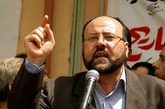
Hamas representative in Lebanon, Ali Baraka, received the Chief of Political Affairs at UN Special Coordinator's Office for Lebanon, Anwar Darkazally, in the presence of senior Hamas leaders.
Darkazally and Baraka discussed the current state of affairs in the Lebanese camps for Palestinian refugees.
Baraka briefed the UN envoy on the Palestinian initiative launched on March 28, 2014 so as to protect Palestinian refugees in Lebanon and prop up the Lebanese-Palestinian fraternity ties.
The Hamas official reiterated the deep concern, overwhelming Palestinian political factions and refugees alike, over the latest measures pursued by the UNRWA, warning of their serious repercussions on the social and security situation inside Palestinian refugee camps.
Baraka called on the UN official to update the UN’s Chief, Ban Ki-moon, on the tragic state of affairs rocking Palestinian refugee camps and to seriously work on restoring the Palestinian refugees’ right of return to their native soil.
Darkazally and Baraka discussed the current state of affairs in the Lebanese camps for Palestinian refugees.
Baraka briefed the UN envoy on the Palestinian initiative launched on March 28, 2014 so as to protect Palestinian refugees in Lebanon and prop up the Lebanese-Palestinian fraternity ties.
The Hamas official reiterated the deep concern, overwhelming Palestinian political factions and refugees alike, over the latest measures pursued by the UNRWA, warning of their serious repercussions on the social and security situation inside Palestinian refugee camps.
Baraka called on the UN official to update the UN’s Chief, Ban Ki-moon, on the tragic state of affairs rocking Palestinian refugee camps and to seriously work on restoring the Palestinian refugees’ right of return to their native soil.

Deputy Foreign Minister Tzipi Hotovely
Deputy Foreign Minister Hotovely meets European officials to demand governments stop providing cash to allegedly anti-Israel organizations.
Israel is demanding that European Union member states halt funding to non-governmental organizations allegedly working to delegitimize the Jewish state. The Foreign Ministry claims that European governments provide 100-200 million euros annually to said groups.
Deputy Foreign Minister Tzipi Hotovely has begun a series of consultations with European foreign ministers, their deputies, and ambassadors of several European countries, in which she is presenting evidence that their governments provide financial assistance to organizations that support boycotts against Israel, "blacken its face around the world, accuse it of ethnic cleansing, apartheid, and war crimes; deprive the Jewish people of their right to self-determination, call to prosecute Israel in the International Criminal Court at The Hague, and support the right of return".
Hotovely claimed that some of these organizations are associated with and actively support terror groups.
Hotovely has met withthe Dutch foreign minister, the Spanish deputy foreign minister, and the ambassadors of Sweden, the European Union, the United Kingdom, Denmark, and Switzerland.
According to Hotovely, the diplomats were presented with detailed documents collected by the Foreign Ministry and the NGO Monitor organization that prove the "problematic" funding. She emphasized that Israel sees support for organizations opposing its right to exist as crossing a red line.
Hotovely has instructed Israeli ambassadors in Europe to demand that ministries increase thier overview of funds given to such groups, warning that if her premptive diplomatic move fails, Israel will be forced to adopt legislation forbidding foreign countries from backing organizations with a clear anti-Israel bent.
According to Deputy Minister Hotovely, these are some of the European investments in such organizations in recent years:
The Human Rights and International Humanitarian Law Secretariat, managed by the Institute of Law at Birzeit University in the West Bank, which received $10.5 million from the governments of Denmark, Sweden, Switzerland, and the Netherlands. The funds were to go to 24 political organizations over three years.
In 2014, the governments of Germany, Sweden, Norway, and the EU provided NIS 415,741 to the Coalition of Women for Peace, an organization that supports aspects of the Boycott, Divestment, and Sanctions movement.
The Netherlands provided NIS 13 million in the last three years to numerous NGOs, including Who Profits, Al-Haq, the Coalition of Women for Peace, and Al-Mezan.
Denmark provided NIS 23 million in the last three years to several NGOs, including Breaking the Silence, BADIL, the Palestinian Center for Human Rights, and other Palestinian organizations.
Switzerland provided NIS 5 million over the last three years to organizations like the Alternative Information Center, Zochrot, the Applied Research Institute, and Terrestrial Jerusalem.
Spain gave NIS 3.8 million in the last three years to groups including Breaking the Silence, the Coalition of Women for Peace, the Alternative Information Center, and NOVA, a Spanish BDS organization.
The United Kingdom provided NIS 12 million in 2008-2011 to Breaking the Silence, Yesh Din, Gisha, Bimkom, Terrestrial Jerusalem, and No Legal Frontiers.
Deputy Foreign Minister Hotovely meets European officials to demand governments stop providing cash to allegedly anti-Israel organizations.
Israel is demanding that European Union member states halt funding to non-governmental organizations allegedly working to delegitimize the Jewish state. The Foreign Ministry claims that European governments provide 100-200 million euros annually to said groups.
Deputy Foreign Minister Tzipi Hotovely has begun a series of consultations with European foreign ministers, their deputies, and ambassadors of several European countries, in which she is presenting evidence that their governments provide financial assistance to organizations that support boycotts against Israel, "blacken its face around the world, accuse it of ethnic cleansing, apartheid, and war crimes; deprive the Jewish people of their right to self-determination, call to prosecute Israel in the International Criminal Court at The Hague, and support the right of return".
Hotovely claimed that some of these organizations are associated with and actively support terror groups.
Hotovely has met withthe Dutch foreign minister, the Spanish deputy foreign minister, and the ambassadors of Sweden, the European Union, the United Kingdom, Denmark, and Switzerland.
According to Hotovely, the diplomats were presented with detailed documents collected by the Foreign Ministry and the NGO Monitor organization that prove the "problematic" funding. She emphasized that Israel sees support for organizations opposing its right to exist as crossing a red line.
Hotovely has instructed Israeli ambassadors in Europe to demand that ministries increase thier overview of funds given to such groups, warning that if her premptive diplomatic move fails, Israel will be forced to adopt legislation forbidding foreign countries from backing organizations with a clear anti-Israel bent.
According to Deputy Minister Hotovely, these are some of the European investments in such organizations in recent years:
The Human Rights and International Humanitarian Law Secretariat, managed by the Institute of Law at Birzeit University in the West Bank, which received $10.5 million from the governments of Denmark, Sweden, Switzerland, and the Netherlands. The funds were to go to 24 political organizations over three years.
In 2014, the governments of Germany, Sweden, Norway, and the EU provided NIS 415,741 to the Coalition of Women for Peace, an organization that supports aspects of the Boycott, Divestment, and Sanctions movement.
The Netherlands provided NIS 13 million in the last three years to numerous NGOs, including Who Profits, Al-Haq, the Coalition of Women for Peace, and Al-Mezan.
Denmark provided NIS 23 million in the last three years to several NGOs, including Breaking the Silence, BADIL, the Palestinian Center for Human Rights, and other Palestinian organizations.
Switzerland provided NIS 5 million over the last three years to organizations like the Alternative Information Center, Zochrot, the Applied Research Institute, and Terrestrial Jerusalem.
Spain gave NIS 3.8 million in the last three years to groups including Breaking the Silence, the Coalition of Women for Peace, the Alternative Information Center, and NOVA, a Spanish BDS organization.
The United Kingdom provided NIS 12 million in 2008-2011 to Breaking the Silence, Yesh Din, Gisha, Bimkom, Terrestrial Jerusalem, and No Legal Frontiers.

The United Nations Monday has approved UN accreditation for the London-based Palestinian Return Center in a defeat for Israel, which claimed the organization “openly promotes terrorism.
”The center, which researches and monitors issues related to dispersed Palestinians and their right to return, denied all Israeli allegations.
Last month, the U.N. committee that accredits non-governmental organizations, recommended that the center’s application be approved.
But Israel circulated a resolution, co-sponsored by the United States, Australia and Canada, to the committee’s parent body, the 54-member Economic and Social Council, opposing the application.
In Monday’s vote, 13 countries supported Israel’s resolution, 16 were opposed and 18 abstained, which meant the resolution was defeated and the application was approved.
Despite the accreditation, Israel’s Deputy U.N. Ambassador David Roet said before the vote that the center “is not what it claims to be.”
The Palestinian Return Centre (PRC), an NGO based in London since 1966, was granted special consultative status at the UN’s Economic and Social Council (ECOSOC) by the Committee on Non-Governmental Organisations on 1 June 2015. Since then, Israeli government officials and affiliated civil society organisations have actively lobbied ECOSOC members to reverse this decision, based on Israel’s allegation that the PRC is affiliated with Hamas.
”The center, which researches and monitors issues related to dispersed Palestinians and their right to return, denied all Israeli allegations.
Last month, the U.N. committee that accredits non-governmental organizations, recommended that the center’s application be approved.
But Israel circulated a resolution, co-sponsored by the United States, Australia and Canada, to the committee’s parent body, the 54-member Economic and Social Council, opposing the application.
In Monday’s vote, 13 countries supported Israel’s resolution, 16 were opposed and 18 abstained, which meant the resolution was defeated and the application was approved.
Despite the accreditation, Israel’s Deputy U.N. Ambassador David Roet said before the vote that the center “is not what it claims to be.”
The Palestinian Return Centre (PRC), an NGO based in London since 1966, was granted special consultative status at the UN’s Economic and Social Council (ECOSOC) by the Committee on Non-Governmental Organisations on 1 June 2015. Since then, Israeli government officials and affiliated civil society organisations have actively lobbied ECOSOC members to reverse this decision, based on Israel’s allegation that the PRC is affiliated with Hamas.
